
In a well-functioning network, each device communicates seamlessly with others, relying on unique IP addresses to maintain its identity and keep everything in sync. But what happens when this system breaks down, and two devices attempt to use the same address? IP conflicts are more common than you might think, causing unexpected disruptions that slow down or even halt network operations. Thankfully, with the right solution in place, these conflicts can be prevented before they even arise, saving network administrators from the burden of manually resolving such issues.
Let’s explore how these conflicts happen and how a proactive solution like DDI Central can protect your network—and your IT team’s valuable time—from unnecessary disruptions.
What is an IP address conflict?
An IP address conflict occurs when two or more devices in the same network are assigned the same IP address, leading to communication issues and network disruptions. Such conflicts can arise from various scenarios, such as manual misconfigurations, DHCP server errors, or devices rejoining the network after an extended period of inactivity.
Windows has detected an IP address conflict: A scenario
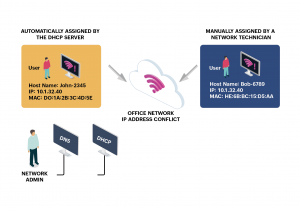
Consider a situation where two employees within an organization experience an IP address conflict. John, a user in the network, is automatically assigned an IP address by the DHCP server according to the standard procedure. Simultaneously, Bob, another user, is inadvertently assigned the same IP address by a network technician through manual configuration.
When both John and Bob try to connect to the LAN, they face connectivity issues due to the duplicate IP assignment and see the warning message below:
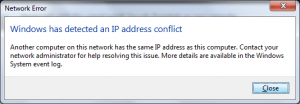
Both users submit support tickets to the network administrator, reporting connection problems. The administrator then begins troubleshooting the issue, sifting through DNS and DHCP logs across multiple consoles to identify the conflicting IP address. This manual process may take hours, delaying resolution and impacting network performance until the administrator can accurately identify and reassign unique IP addresses to resolve the conflict.
Common causes of IP address conflicts
IP address conflicts in on-premises networks occur when two or more devices are assigned the same IP address, which disrupts network communication. The most common causes of IP address conflicts include:
-
Static IP misconfiguration: Manually assigned static IP addresses can sometimes overlap, especially in large networks with many devices and multiple administrators. When two devices are inadvertently assigned the same static IP address, they cannot communicate properly in the network, leading to connectivity issues and often taking significant time to troubleshoot and resolve. Static IP conflicts are typically caused by human error, wherein IP address assignments are duplicated or aren’t updated when devices are added or removed.
-
DHCP errors: DHCP servers occasionally assign duplicate IP addresses due to misconfigured DHCP scopes, overlapping IP pools, or failure to track assigned addresses properly.
-
Multiple DHCP servers: When multiple DHCP servers are running in a network without coordination, they may inadvertently assign overlapping IP addresses to devices. This is especially likely to occur in complex networks with multiple routers or wireless access points where each DHCP server might attempt to manage IP address assignments independently. The lack of synchronization can lead to IP conflicts, connectivity issues, and administrative challenges in tracking and resolving such conflicts.
-
Devices waking from sleep: Devices that go into standby or hibernate mode may attempt to reuse an old IP address upon waking, and this IP might have already been assigned to another device by the DHCP server.
-
IoT devices and BYODs: Many IoT devices come with default static IP addresses that can conflict with dynamically assigned addresses, and personal devices can introduce conflicts when they share the same IP range as internal devices.
-
Malicious actors infiltrating the network: Rogue DHCP servers or ARP spoofing attacks can result in intentional IP conflicts. Rogue DHCP servers may assign conflicting IP addresses, while ARP spoofing can lead to devices accepting incorrect IP-to-MAC mappings, disrupting the network.
How to prevent IP address conflicts with DDI Central
DDI Central integrates DNS, DHCP, and IP address management (IPAM) onto a unified platform, providing network administrators with comprehensive tools to prevent and resolve IP address conflicts. DDI Central helps prevent these conflicts through centralized IPAM. Here’s how it works:
-
Unified visibility of static and dynamic IPs
DDI Central consolidates IP address data from both static (manually assigned) and dynamic (DHCP-assigned) sources and categorizes it into static subnets and DHCP subnets on a single, centralized console. This setup provides network administrators with a comprehensive view of all IP addresses across each type of subnet, including details such as lthe ease status, capacity distribution, and availability thresholds. With this unified visibility, administrators can efficiently manage IP addresses across the network, reducing the risk of accidental duplication and ensuring better overall network reliability. -
Scope type delineation
With DDI Central, administrators can reserve IP ranges specifically for static and dynamic addresses, preventing overlap by clearly delineating which IPs are manually assigned and which are available for DHCP allocation. A subnet declared as a static subnet within DDI Central cannot be accessed by the DHCP server for automatic provisioning and can only be managed by the admin. This organized approach makes it easy to plan IP usage without the risk of overlapping.
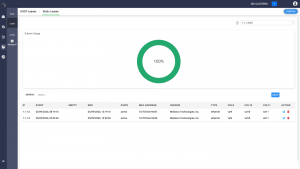
- Simplified IP address changes and auditingWhen updates are needed, administrators can quickly reassign or release IP addresses directly through the DDI Central console. Historical IP usage logs are also maintained, providing an audit trail that shows when each IP was assigned, released, or changed, which is helpful for both resolving conflicts and preventing future ones.
- High-availability DHCP pairs for seamless, automatic IP provisioningDDI Central ensures continuous IP provisioning by supporting high-availability configurations for DHCP servers. This ensures that only authorized servers are responsible for IP address provisioning, thereby preventing conflicts arising from multiple DHCP servers. In an high-availability setup, DHCP servers operate in primary and secondary pairs, providing redundancy and load distribution. DDI Central offers two modes for high-availability:
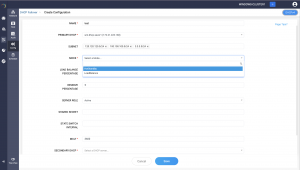
-
-
HotStandby mode: In this mode, the primary server actively assigns IP addresses, while the secondary server remains on standby. If the primary server fails, the secondary one seamlessly takes over, ensuring uninterrupted IP address assignment.
-
-
-
LoadBalance mode: In this mode, the primary and secondary servers share the workload, distributing IP address assignments to manage high traffic efficiently. This setup reduces the load on individual servers and enhances redundancy.
-
In addition to high-availability configurations, DDI Central’s coordinated DHCP servers enable the automatic provisioning of IP addresses based on policies encompassing multiple complex criteria defined for specific subnets, address pools, shared network, or hosts. By associating IP assignments with predefined policies and using DHCP fingerprinting, DDI Central can verify a device’s identity and determine its eligibility for particular subnets or scopes. This setup helps prevent IP conflicts and ensures that devices consistently receive the correct IP address allocations in line with network policies.
-
- Active IP lease monitoring
DDI Central actively monitors and manages DHCP leases by tracking which IPs are currently assigned, when they are abandoned, and when they are expected to expire. When a device reconnects, DDI Central verifies if its previous IP address is still available. If the address is already in use, DDI Central can assign a new IP automatically, preventing conflicts. This process, coupled with lease tracking, helps ensure that devices coming out of sleep mode receive valid, conflict-free IPs. - Strict lease policy enforcement
DDI Central can enforce DHCP policies that specify the lease duration and renewal conditions, ensuring that IP addresses are reallocated in a way that minimizes conflicts. For example, it may assign a new IP if the original lease expired or if the device has been inactive for an extended period of time beyond the designated lease period. - Centralized IPAM
DDI Central provides centralized visibility and control over IPAM, allowing administrators to segment IP address ranges using the DHCP scope manager tool and assign specific IP address pools for IoT devices, BYODs, and internal devices. By isolating IP ranges, administrators can efficiently allocate and monitor IP addresses, reducing the risk of overlaps and conflicts. DDI Central also enables IP policy enforcement, so new devices must adhere to the DHCP server’s designated IP schemes, options, and policies for the subnet, minimizing the risk of conflicts.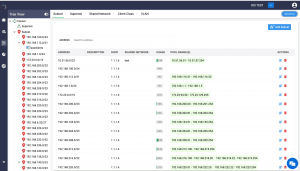
- Policy-based, automated IP address allocation
By automating the assignment of IP addresses through granular-level DHCP fingerprinting policies, DDI Central minimizes human error and ensures that each device receives a unique IP address.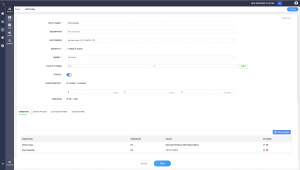
-
Enhanced security
DDI Central includes security features to detect and prevent rogue DHCP servers and ARP spoofing. It monitors the network for unauthorized DHCP servers and alerts administrators so they can take action. Additionally, DDI Central’s DHCP fingerprinting, MAC-based filtering, and policy-based IP assignment help administrators enforce device identities and ensure that only authorized devices receive IP addresses. These measures add layers of security to protect against malicious actions that could cause IP conflicts.
How to resolve IP address conflicts with DDI Central
When conflicts do occur, DDI Central equips network administrators with the tools to swiftly identify and resolve them:
-
A detailed IP address inventory: Administrators have access to a comprehensive inventory of IP addresses, their current leases, and the lease history within each subnet, facilitating the identification of conflicting addresses and their associated devices.
-
Historical data and lease information: DDI Central maintains records of IP address assignments, including the lease duration, device associations, and lease histories of specific IPs along with their DNS zone associations, thereby aiding in troubleshooting and conflict resolution.
-
Hands-on IP inventory control: With DDI Central’s Manage IP page in its IPAM module, network admins have hands-on control over the IP address inventory within a specific subnet. This enables them to promptly assign one of three IP address categories (as a fixed address or DHCP reservation) to a host that is unable to join the network due to a conflict:
-
Reserved: IP addresses that belong to the subnet but are not declared for excluded from DHCP automatic provisioning
-
Available: IP addresses that are open for active leasing
-
Free: Previously leased IP addresses that are now unassigned and available
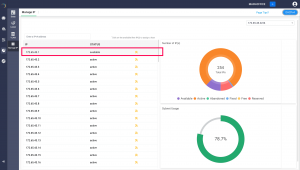
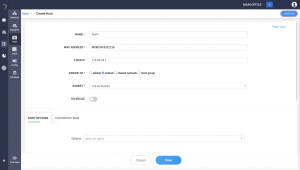
IP address conflicts are a persistent challenge for network administrators, affecting productivity, connectivity, and overall network performance. DDI Central offers a comprehensive solution by centralizing DNS, DHCP, and IPAM on a unified console, streamlining IP allocation, monitoring, and conflict resolution. With features like unified visibility of static and dynamic IP addresses, high-availability DHCP servers, and active lease monitoring, DDI Central effectively prevents and resolves IP address conflicts. This leads to seamless network operations and a more efficient, reliable, secure IT environment.
Ready to experience hassle-free IP management?
Discover how DDI Central can enhance your network’s efficiency by starting a free, 30-day trial. Contact us today to schedule a personalized demo and see the difference DDI Central can make in preventing IP conflicts and optimizing your network management.

